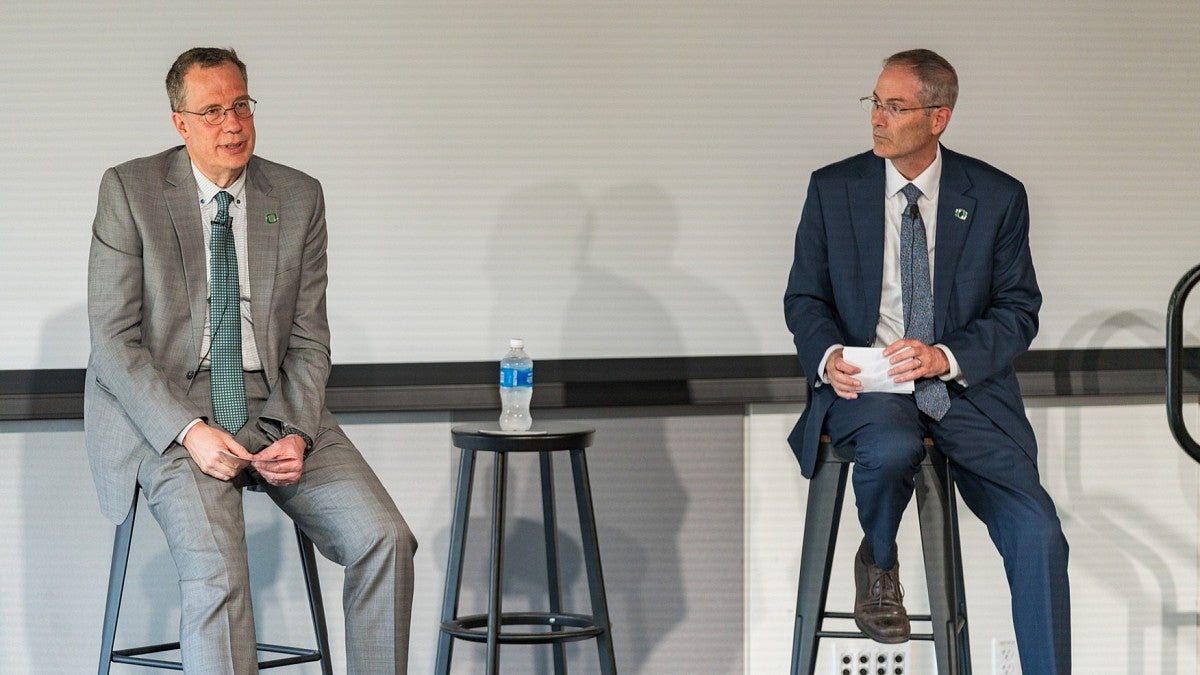President Karl Scholz and Provost Christopher P. Long held a town hall Monday with University of Oregon employees to discuss significant financial challenges facing the UO, emphasizing a commitment to respond with resolve and a principled approach to protect the university’s mission and community.
During a meeting in the EMU Redwood Auditorium that was also held virtually, the two university leaders reviewed fiscal challenges, addressed the financial forecast, shared the budgeting process and responded to submitted questions.
The university faces a $25-30 million structural deficit in the Education and General fund budget because of multiple external factors that include changes to federal research funding, limited state support and shortfalls in out-of-state student enrollment projections.
Scholz and Long anticipate a 4 percent average reduction to the budgets of administrative units and a 2.5 percent average reduction to the budgets of schools and colleges, both in addition to actions that some schools, colleges and administrative units must take to address preexisting deficits.
“We have to be in the mindset of doing less, better,” Scholz said, adding they weren’t going to just reduce staff and ask people to work harder. “We have to figure out what we can do less of and then choose those things wisely so they don't jeopardize our commitments to students, our commitments to research excellence, our commitments to one another, and then try to improve on those smaller set of things that we’re doing. That’s where we’re trying to go out of this process: to do less, but do it better.”
About 1,500 UO community members participated in the town hall either virtually or in person. Over 400 submitted questions highlighted several recurring themes: decision making and budget processing, staffing and pay reductions, academic priorities, and the impact on Oregon Rising.
Over the summer, Scholz and Long will confer with the deans of schools and colleges and vice presidents of administrative units, as well as other academic and administrative leaders. They’ll develop approaches that support the UO’s goals, education and research missions, and legal and contractual obligations, while being mindful of the impact of various options. Their plan is to make and communicate any changes during fall term to address the structural deficit.
“We’re going to have to be very intentional about how we do this,” Long told the audience. “We’re not just talking about reading numbers off a spreadsheet and drawing a line and making budget cuts. What we’re asking each other to do is to engage across leadership and try to reach into the fabric of the organization to get as much of the wisdom as we can, to make the most intelligent and wise decisions that we can make. Hard decisions are going to have to be made and those decisions are going to be made by the academic and administrative leaders of the institution.”
Federal actions have eliminated or suspended research funding at a scale the university can’t replace, and other executive actions threaten the university’s international student enrollment, Scholz and Long said.
At the state level, the governor’s recommended budget provides a 2.8 percent increase to higher education funding for next year, substantially below the expected growth in UO costs. Those increased costs include compensation and state-mandated programs such as the Oregon Public Employees Retirement System. The university is also trending short of its target for out-of-state students, who pay higher tuition and have an outsized impact on the budget.
The cumulative effect of federal and state actions, admissions results, hiring decisions across the institution and labor contracts is the growth rate of pay and benefits at the UO sharply exceeds the growth of revenue.
“What key areas do I expect our university to strengthen and invest in for the long-term future during this turbulent time?” Scholz asked. “There are remarkable people here. While I’m deeply, deeply troubled about the next few months and what we have to navigate together, this place is amazing. I’m confident that the world will see that. We’re focusing, in Oregon Rising, on what really matters.”
To view a recording of the town hall and answers to frequently asked questions, visit the Strengthening UO website.
—Matt Cooper, University Communications


